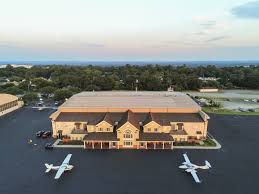Augusta Aviation, Inc., with its two airports, Augusta Regional Airport at Bush Field and Daniel Field, produces millions of dollars in economic impact every year.
In fact, without those two airports operating together in real time synchronization, there would be no way to put on an international golf tournament like the Masters.
Possible closing of Daniel Field
In fact, it wasn’t that long ago that Daniel Field was nearly slated for closure and, ironically, the movement for doing away with Daniel Field was being heralded by some as a march toward progress.
It would be the voice of one Betty Holmes, considered to be Augusta’s first lady of aviation, who stopped the “progress” in its tracks.
Starting in the 1950s, Augusta went on a “modernist” binge that saw the destruction of the Forrest-Ricker Hotel, the old City Courthouse and Union Station; and that backward “progress” carried over into the 1970s with the “toaster” penthouse being added to the beautiful Lamar Building in downtown causing many to wish that famed architect I.M. Pei had never visited the city.
According to Ed Cashin, writing in his book, “From Balloons to Blue Angels: The Story of Aviation in Augusta, Georgia,” the sudden craze of “out with the old and in with the new,” was born out of the end of the Great Depression, as well as the end of World War II.
Augusta was already ahead of the game, in terms of aviation, as early as 1910, when Wilbur Wright visited the city just on the heels of President-Elect William Howard Taft.
It was during this time, according to Cashin, that Wright discovered the winter colony in Augusta, which were the wealthy Northerners who came to town each winter and set up camp in the Summerville area for a season of golf and highballs.
Having access to that kind of wealth convinced Wright to locate a flight training school in Augusta and he did so that very year.
As the drums of war began to beat overseas in Europe, the question in America was not a matter of whether America would be drawn into the conflict, but when.
No sooner than the election of 1916 ended, President Woodrow Wilson international events compelled the United Stated into what became known as “The War to End All Wars.”
U.S. Army and Daniel Field
Daniel Field became property of the U.S. Army as part of its Camp Hancock installation and trained young pilots before they headed overseas to meet an unknown fate.
Not much changed in the interwar period, with the exception that Augusta was no longer the favored spot for the wealthy to convene each winter.
After the Great Depression, followed by four years of a devastating war, Augustans along with the rest of the country longed for a return to normalcy. The folks in Summerville had, for generations, lived with the secret terror that one errant match at the Augusta Arsenal could level their homes.
Meanwhile, the roaring sound of airplanes overhead and taking off from Daniel Field put nerves on end, and people fretted that one wrong move from a student pilot could wreak havoc on the neighborhood.
Also, while cars of the ‘50s decade began to resemble airplanes without wings, the commercial airline business had yet to take off. With a new interstate highway system being planned, it was far more cost effective to load luggage in the family Ford to go off on vacation than book an airline flight.
Those looking at Daniel Field also knew that if commercial air travel ever really became big business, it would be with jet planes. For this purpose, Daniel Field obsolete. The big jets need vastly more runways than a piston prop-driven plane.
Was Daniel Field a liability?
According to Cashin, leaders on the Augusta City Council saw Daniel Field as a major liability. With only three main roads servicing downtown Augusta and the ever-growing suburbs, one of those roads, Wrightsboro Road, was partially blocked off by the airport complex.
Members of the council already saw businesses shutter on Broad Street and move to the outer areas for conveniences, and they felt scrapping the airport would help eliminate that trend.
Moreover, even though Daniel Field had Southern Airways as a dedicated scheduler of flights, Cashin reports that the carrier was lucky if it had three passengers a day.
Keeping Daniel Field alive
Enter Betty Holmes.
Holmes had flown her first solo flight at the age of 21 and had become a bit of a heroic figure in local aviation circles. Cashin writes that Holmes was considered Augusta’s version of “Lucky Lindy.” She had to crash land her airplane twice, on the same day, into fields after once being given the wrong formulation of gasoline and later due to a failed engine rod.
All of the forces against keeping Daniel Field alive came together Feb. 19, 1953 at a city council meeting where The Augusta Chronicle proclaimed that the “Daniel Field argument will be thrashed out thoroughly.”
According to Cashin, Holmes was not aware that she was to speak at the meeting, but when handed the microphone, her voice rained down like that of a Southern Baptist tent revival preacher.
Holmes accused those of wanting to demolish the airport to be engaging in graft and corruption, stunning the crowd that a woman, of all people, would dare make such an accusation publicly.
The local news media gleefully reported that Holmes speech caused “muttering in the audience.”
Later, Holmes was persuaded by colleagues to issue an apology to the city council, which she did, but her case was already made. It was decided to rejoin Wrightsboro Road and allow greater vehicular access, but to also spare the airport.
…And that is something you may not have known.












